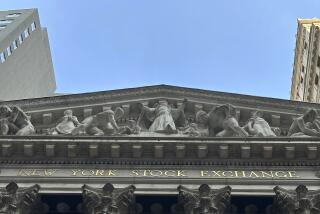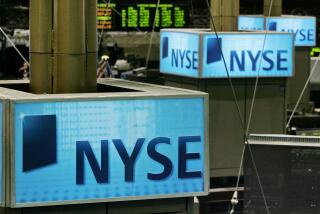Investors Leery of Tech Growth Promise
- Share via
Despite the rebound in technology stocks in January, many investors remain suspicious about the industry’s earnings-growth potential in 2001 and beyond.
That suspicion showed up in the pullback in many tech stocks in recent days after the January jump, analysts say. The tech-dominated Nasdaq composite index rose 21.28 points, or 0.8%, to 2,664.49 on Tuesday, but its year-to-date gain has been pared to 7.9% from 12.2% at the end of January.
Cisco Systems only added to the concerns Tuesday as it reported quarterly sales and earnings that fell short of expectations--a rarity for the computer networking giant.
The Cisco news, including the company’s warning to analysts to be more conservative in their view of sales growth potential in the next two quarters, points up the risk in tech stocks, even at what may appear to be severely depressed prices, experts say.
Though the share prices--and the stocks’ price-to-earnings ratios--are far below their peak levels reached last year, most tech issues still carry lofty P/Es relative to the average stock.
Historically, Wall Street has always rewarded the fastest-growing companies with higher stock P/Es.
But if current expectations for tech firms’ earnings growth in 2001 turn out to be wildly optimistic, the stocks could be hammered even lower, analysts warn.
The experience of personal computer makers’ shares over the last year shows how harsh the market can be when investors lose faith in a company’s growth potential.
Despite weakening sales, PC maker Gateway Inc. still is expected to earn $1.35 a share this year, as measured by the average estimate of analysts surveyed by IBES International.
What’s more, the average estimate for 2002 is $1.71 a share, according to IBES. That would represent 27% growth from the 2001 estimate.
Yet Gateway stock, at $20.75 now on the New York Stock Exchange, is priced at a mere 15 times the 2001 earnings estimate. That is a far cry from the stock’s peak P/E of 53 a year ago, based on trailing four quarters’ earnings at the time.
Typically, Wall Street sets such low P/Es only on stocks of companies in cyclical or slow-growth businesses. Thus, despite analysts’ optimism about Gateway’s ability to restore earnings growth by 2002, investors so far are refusing to pay up for the stock. In effect, they are building in the probability that the company’s earnings will be below even current lowered estimates.
That reflects investors’ increasingly dim view of growth prospects for the personal computer business in general. Salomon Smith Barney analyst Richard Gardner recently cut his earnings estimate for Dell Computer’s fiscal year ending in January 2002 to 85 cents a share from 93 cents. That would represent virtually no growth from the company’s expected fiscal 2001 results of 84 cents a share.
Dell shares, which at their peak last March were priced at about 70 times expected earnings for the year, now are priced at about 30 times this year’s expected results.
Overall, investors are taking a much more conservative approach to tech stock P/Es now than last year. But the declines in valuation are relative.
Cisco shares, after a steep decline, now are priced at 46 times the 78 cents a share that analysts on average expect the company to earn in its fiscal year ending in July.
Cisco’s stock had sold for a P/E of nearly 190 at its peak last year, so the current P/E is a sharp discount to the levels that prevailed during the tech stock frenzy. But whether 46 is “cheap,” analysts note, depends on whether Cisco in fact meets current 2001 earnings estimates--and whether the estimate for 2002, now 99 cents a share, remains realistic.
Implicit in tech stock P/Es is many investors’ continuing trust that, even if tech industry growth rates come down, they will remain stellar compared with nearly every other industry.
Cisco Chief Executive John Chambers said Tuesday that he expects the company’s sales growth rate to be between 30% and 50% in the fiscal year that begins in August. On average, analysts surveyed by earnings tracker Zacks Investment Research still believe the company is capable of 34% annualized earnings growth over the next five years.
If that profit growth figure is in the ballpark and Cisco indeed earns about 78 cents a share this year, the company would earn about $1.40 a share in fiscal 2003. Someone buying the stock at the current price would be paying a seemingly reasonable 25 times the 2003 earnings estimate.
Likewise, the stock P/E of telecom equipment supplier Ciena has fallen from nearly 2,000 last year to 122 now. The current P/E is based on analysts’ average earnings estimate of 68 cents a share for the company for this year.
Analysts also expect Ciena to earn $1.15 a share in 2002. That would be 69% growth from 2001, if both years’ estimates are accurate. And if Ciena can match analysts’ five-year expected growth of 40%, projected P/Es drop further.
Jeffrey Applegate, investment strategist at brokerage Lehman Bros., argued in a note to clients this week that major technology stocks as a group are undervalued given their expected long-term earnings growth rates and the stocks’ current P/E ratios.
But judging undervalue and overvalue in the stock market is hardly an exact science. And as many tech shares have demonstrated over the last year, the higher the P/E, the greater a stock’s likely plunge if the company disappoints even slightly.






